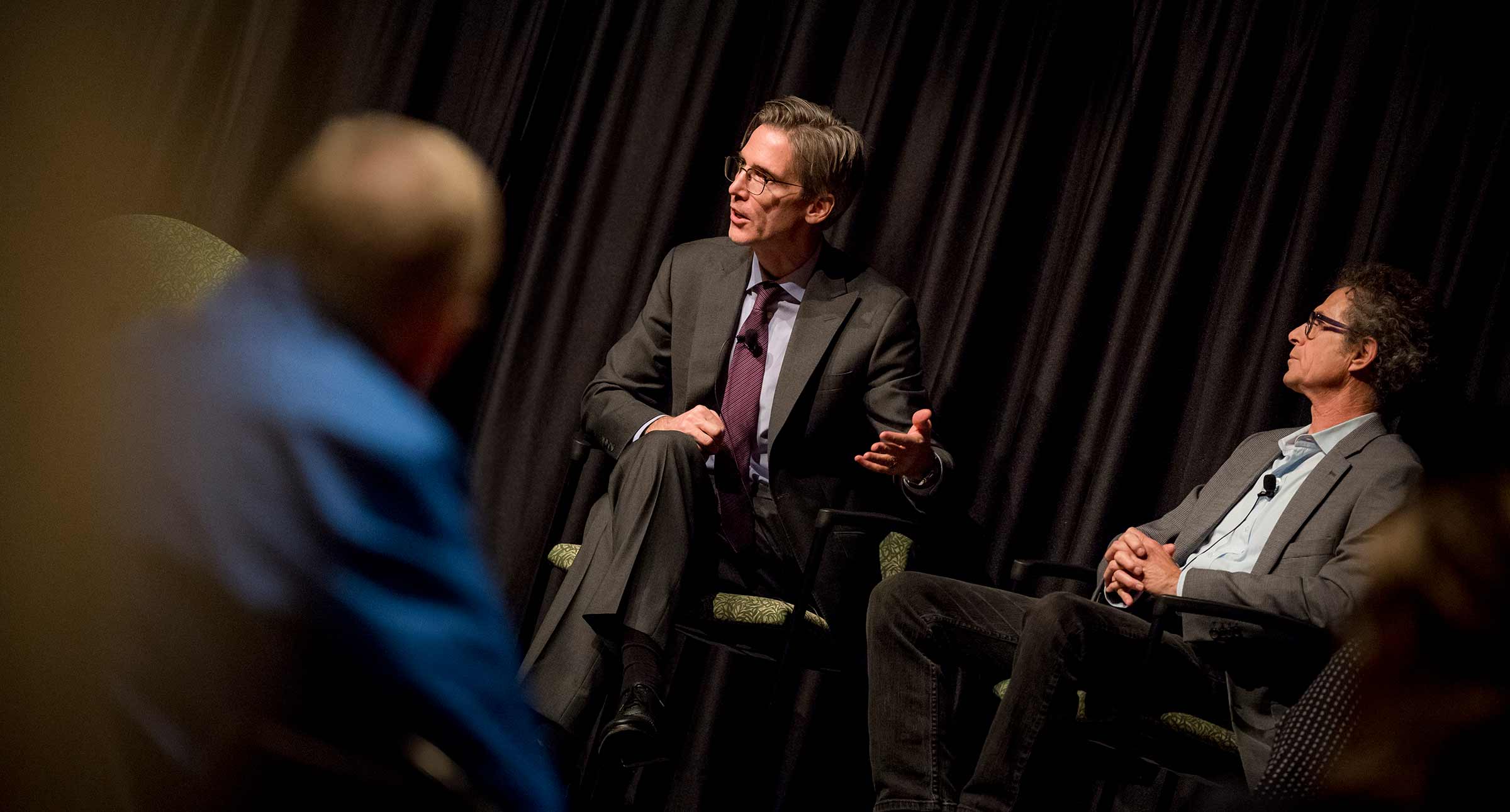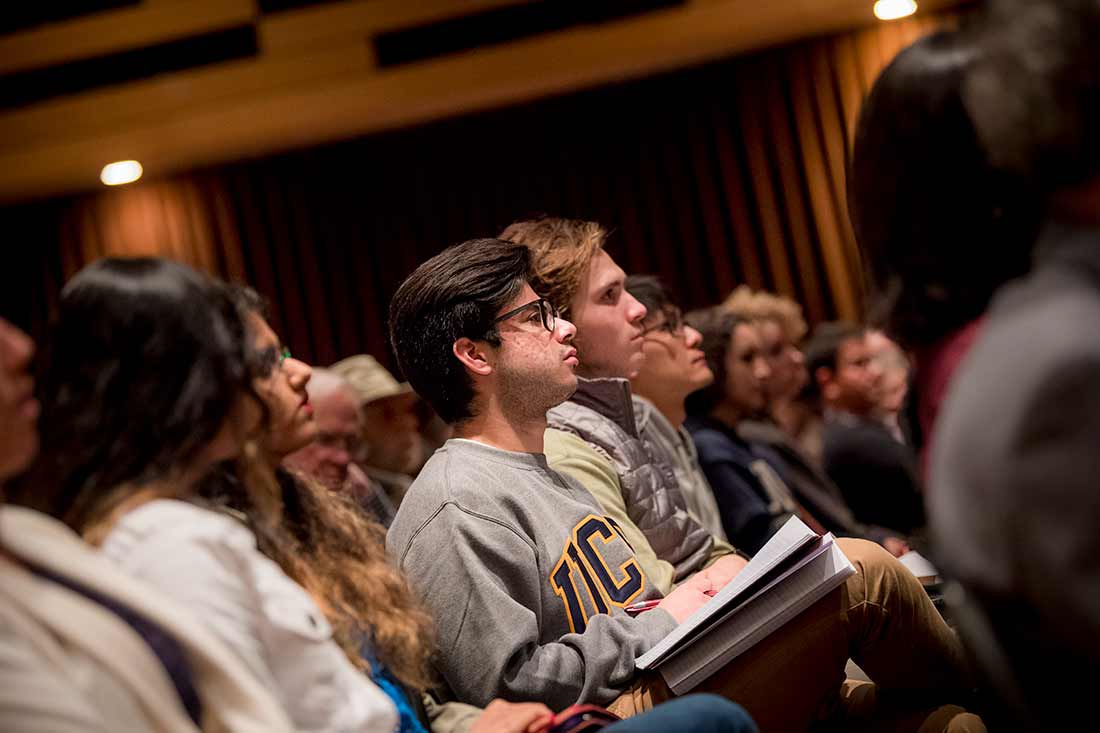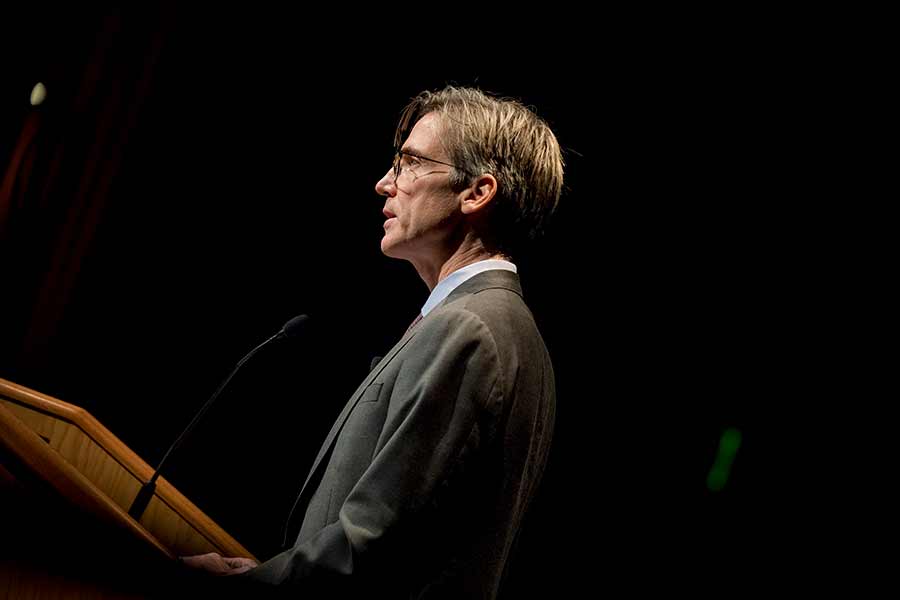Scientists Discover a New Signaling Pathway and Design a Novel Drug for Liver Fibrosis
Health & Behavior
By:
Published Date
By:
Share This:

Seton Hall Law Professor Thomas Healy (left) was joined by UC San Diego Communication Professor Robert Horwitz to field questions at the event. Photos by Erik Jepsen/UC San Diego Publications
What is “free speech” and is it at risk on college campuses? Are raucous and violent demonstrations that disrupt or shut down campus speakers and events a legitimate form of “counter-speech” or a chilling attempt to silence open debate and the free exchange of ideas?
Speaking Nov. 8 to a full house—many of them students—in UC San Diego’s Price Center East Ballroom, Seton Hall Law Professor Thomas Healy addressed these and related questions in his talk, “Who’s Afraid of Free Speech.” Healy is author of “The Great Dissent: How Oliver Wendell Holmes Changed His Mind—and Changed the History of Free Speech in America.” He worked for many years as a newspaper reporter, first in North Carolina and later as Supreme Court correspondent for the Baltimore Sun and continues to write for The Atlantic, The Nation, The L.A. Review of Books and other publications.
“If you paid any attention at all to the news over the past year or two, you probably know that free speech in the United States is under attack,” said Healy. “And the people who are attacking it are you … well at least those of you who are college students.”

The talk about free speech generated a full house—many of them students—in UC San Diego’s Price Center East Ballroom.
Healy’s goal that evening was to give the audience a framework to understand the free speech implications of social protest and pushback. He also wanted to encourage everyone to think beyond the question of what free speech permits and to consider the personal and strategic consequences of the choices we all make.
“Speech is a powerful weapon,” he said. “It can cause grave harms. Harms to national security, to personal reputation and privacy, to economic interests. And the First Amendment does not entirely prohibit the government from suppressing speech in order to prevent those harms.”
Counter-speech is one mechanism we rely on as an alternative to government pushback. It can take many forms:
Healy suggested that much of the social pushback that critics complain about on campus and in public life—indeed the entire phenomenon of political correctness—can plausibly be described as counter-speech. “And because counter-speech is one of the mechanisms we rely on as an alternative to government censorship, such pushback is not only a legitimate feature of our free speech tradition, but an indispensable one.”
He added, “Life, unlike college, is not a debating exercise and it would be naïve to insist that individuals adhere to some prim, idealized vision of public discourse. And that I think is what bothers so many of the critics of campus protests and political correctness. The fact that so much of the social pressure and pushback they observe takes in a nasty vindictive tone that is painful to watch. But it’s worth remembering that free speech often is painful.”

Thomas Healy is author of “The Great Dissent: How Oliver Wendell Holmes Changed His Mind—and Changed the History of Free Speech in America.”
One of the most important points Healy made in his speech was that there is a difference between what free speech allows and what our own codes of personal conduct allow. “Just because free speech permits you to march in a Nazi parade doesn’t mean you should do it. And just because someone says something you find offensive or even hateful doesn’t mean you’re required to respond with the full arsenal of social pressure at your disposal. In fact, there are good reasons to sometimes respond to offensive speech in a more measured, restrained way. For one thing, allowing hateful speakers to pull you down into the muck of viciousness and malice can have a corrosive effect, leaving you to abandon your own principles and personal ethics."
Hosted by the UC San Diego Department of Communication, this was the first in a series of talks with the campus community exploring free speech. The event is part of the university’s First Amendment education initiative dedicated to upholding the principles of free speech and expression, which aligns with the University of California’s commitment to free speech.
“There have been more serious issues about the First Amendment on campuses today than perhaps at any time since the free speech movement,” UC President Janet Napolitano said in a recent interview. “The students themselves are raising questions about free speech and does it apply to homophobic speech, does it apply to racist speech? We have to consider the student concerns but return to basic principles about what free speech means and how do we better educate students about the extent of the First Amendment.”
The University of California, where the free speech movement started and students now argue over how far unrestricted expression should go, announced plans in October to launch a national center to study First Amendment issues and step up education about them.
Share This:
Keep up with all the latest from UC San Diego. Subscribe to the newsletter today.